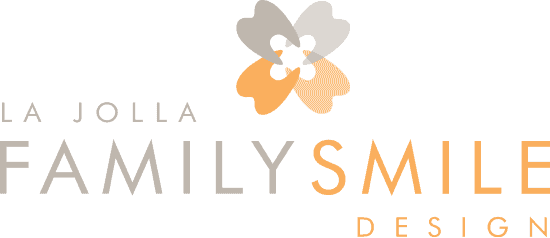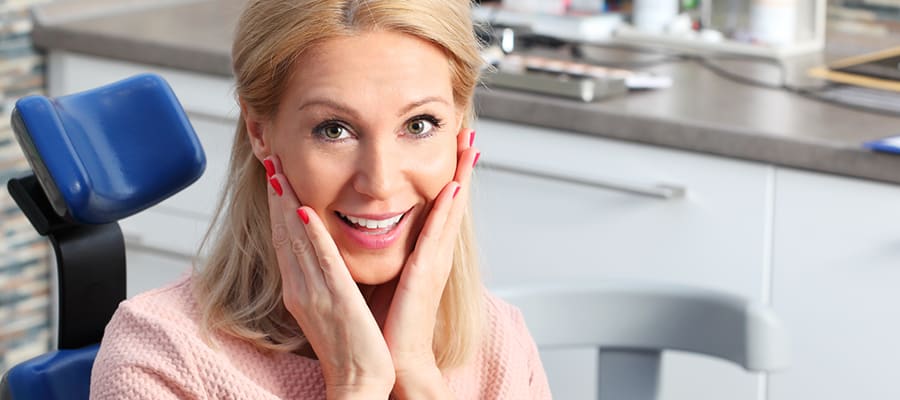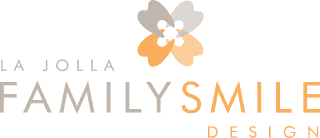
Maintaining healthy teeth and gums requires much more than dental cleanings twice a year. Seeing our dentists at La Jolla Family Smile Design regularly is important, but a good dental home care routine is just as essential. The at-home habits you follow and how consistently you stick to these habits will affect how clean and healthy your mouth is. Good at-home care reduces your risk of cavities and gum disease and helps you avoid the uncomfortable symptoms of oral health problems. Regular at-home care also prevents bad breath.
Recommendations for At-Home Oral Hygiene
Brushing
Brushing your teeth removes food particles and plaque from the teeth. If plaque is not removed, it feeds off of foods containing sugar and produces an acid that breaks down tooth enamel, causing cavities. Plaque that is not removed with brushing also hardens into tartar, which cannot be removed with a toothbrush. Tartar can lead to other issues, such as inflammation that causes periodontal (gum) disease.
Commit to brushing twice a day for at least two minutes at a time. If you have trouble handling a regular toothbrush, you may find an electric or battery-operated toothbrush easier to use. Replace your toothbrush or electric brush head approximately every three months or sooner if the bristles become warped.
Flossing
A toothbrush can’t reach bacteria and food particles in tight spaces between the teeth or under the gumline, but flossing can. Floss at least once a day. If arthritis or dexterity problems make it challenging to use dental floss, you can try an interdental cleaner, such as a dental pick or a water flosser.
Lifestyle recommendations
Other important habits to promote good oral health include the following:

- Eat a healthy diet and plenty of foods that are rich in calcium, such as cheese, yogurt and green leafy vegetables. Limit consumption of sugary foods and beverages.
- Rinse your mouth with water after each meal to remove food particles.
- Rinse with a fluoride mouthwash after brushing and flossing. Fluoride is a mineral that helps strengthen tooth enamel.
- Do not smoke.
- Do not use your teeth to open bottles or packages or chew on pen caps.
- If you know you grind or clench your teeth at night, get fitted for a custom night guard to protect your teeth from the repetitive force.
- If you play a contact or collision sport, wear a protective mouth guard.
Customized dental hygiene routine
If you have a history of dental disease or are considered high risk for dental problems, you could benefit from a more customized routine. Our team will help you formulate a strategy to minimize your risk of problems and maintain a healthy smile.
Dental Home Care FAQs
What are the benefits of a dental cleaning?
Dental cleanings offer many benefits, including:
Thorough plaque removal: Dental cleanings help eliminate plaque and tartar buildup, which cannot be effectively removed through regular brushing and flossing.
Cavity and gum disease prevention: By removing plaque and tartar, dental cleanings help prevent cavities and gum disease, thus contributing to long-term oral health.
Early detection: Regular cleanings also provide an opportunity for our dentists to detect early signs of dental problems, like periodontitis or tooth decay, which can then be promptly addressed.
How can I best maintain my oral health at home?
Brushing twice daily and flossing regularly prevents plaque from accumulating on the teeth. You should also incorporate good lifestyle practices, such as consuming a balanced diet that is low in sugary and acidic foods, which can help prevent tooth decay and enamel erosion. Even with great dental hygiene at home, patients still need regular dental visits for optimal oral health.
What causes bad breath (halitosis)?
Diet and beverages: Occasional bad breath is common, and your diet can contribute to it. Certain foods and drinks, such as garlic, herbs, coffee, pizza, and even some vegetables, can leave a lingering odor in the mouth.
Inadequate oral hygiene: When food particles remain in the mouth and are not brushed away or removed with floss, bad breath can follow. Underlying dental problems like tooth decay and gum disease are also contributing factors.
Smoking: Tobacco and cigarette use can contribute to persistent oral odors, as the scent of smoke can linger on the breath. Smoking can also result in dry mouth, creating an environment where bacteria can thrive.
Does it matter if I use a manual or electric toothbrush?
When it comes to choosing a toothbrush, the initial decision often revolves around selecting either a manual or electric toothbrush. Nevertheless, the choice generally comes down to personal preference and the advice of your LJFSD dentist. Typically, if you can effectively clean your teeth with your current manual toothbrush and it does not negatively impact your oral health, you do not necessarily need to switch to an electric model.
Do home remedies help with toothaches?
While home remedies are convenient for many patients and may offer temporary relief for tooth pain, they are not appropriate as a long-term solution for toothaches. It is important for patients experiencing this sort of pain to promptly seek professional dental care. Toothaches often indicate the presence of an underlying issue, like advanced tooth decay, which may necessitate professional treatments like root canal therapy. Not treating these issues can lead to serious damage or tooth loss.
What are the initial symptoms of gum disease?
Gum disease occurs when your gums are inflamed or infected, which presents a threat to overall oral health. This condition is progressive and, in its advanced stages, can even cause tooth loss. The first stage of gum disease is known as gingivitis, which is associated with symptoms such as reddish gums that bleed easily. With proper at-home dental care and professional cleanings, healthy gums can be restored.
Learn More about At-Home Oral Care
La Jolla Family Smile Design cares about your oral health. We want to be a resource and support for you as you build your at-home oral care routine. Our dentists and hygienists are happy to review your brushing and flossing technique and show you tips and tricks to optimize your at-home care.






